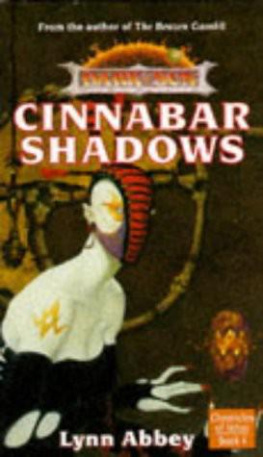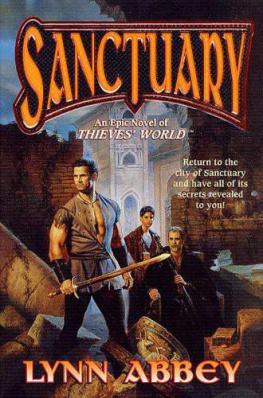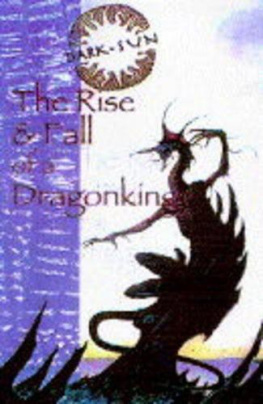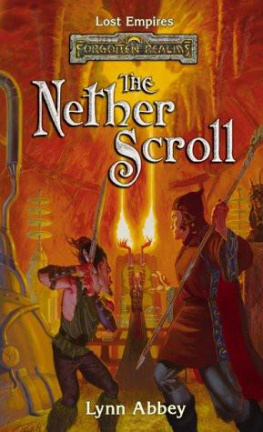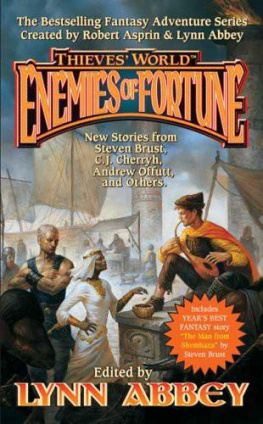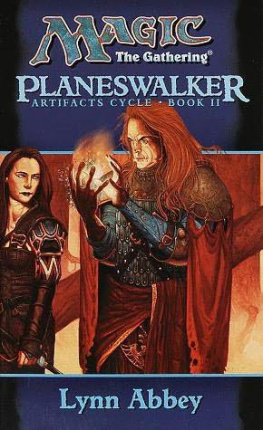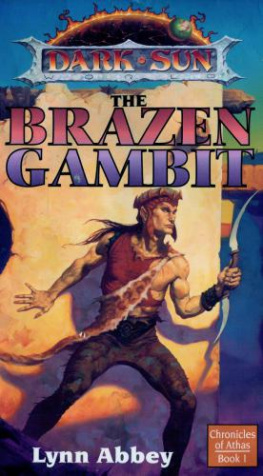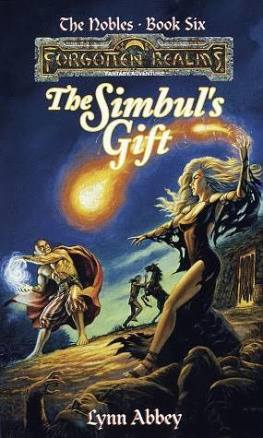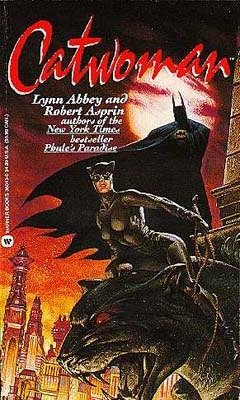Lynn Abbey
Cinnabar Shadows
Dark Sun, Chronicles of Athas, Book 04
This book is dedicated to Lonnie Loy my accountant
Chapter One
Urik.
Viewed through the eye of a soaring kes'trekel, the walled city was a vast sulphur carbuncle rising slowly out of a green plain. Towers, walls, and roofs shimmered red, gold, and amber, as if the city-state itself were afire in the steeply slanted light of a dying afternoon. But the flames were only the reflections of the sun's bloody disk as it sank in the west: an everyday miracle, little noticed by the creatures great and small, soaring or crawling, that dwelt in Urik's purview.
Roads like veins of gold traced from city walls to smaller eruptions in the fertile plain. Silver arteries wove through the patchwork fields that depended on that burden of water as Urik depended on the fields themselves. Beyond the ancient network of irrigation channels, the green plain faded rapidly to dusty, barren badlands that stretched endlessly in all directions except the northwest, where the dirty haze of the Smoking Crown Volcano put a premature end to the vision of man and kes'trekel alike.
Drifting away from the haze, toward the city, a kes'tre-kel's eye soon enough discerned the monumental murals decorating the mighty walls. One figure dominated every scene: a powerful man with the head of a lion. Sometimes inscribed in profile, other times full-face, but never without a potent weapon grasped in his fist, the man's skin was burnished bronze, his flowing hair a leonine black, and his eyes a fierce, glassy yellow that shone with blinding brilliance when struck by the sun.
The kes'trekel swerved when Urik's walls flashed gold. Through uncounted generations, the scaled birds had adapted to the harsh landscapes of the Athasian Tablelands. They knew nothing natural, nothing worthwhile, nothing safe or edible shone with such a brief yet powerful light. Given their instincts and wings, they sought other, less ominous night roosts. The men and woman trudging along the dusty ocher roads of Urik's plain possessed the same instincts but, bereft of wings, could only flinch when the blinding light whipped their eyes, then swallow a hard lump and keep going.
Unlike the kes'trekels, men and women knew whose portrait was repeated on Urik's walls: Lord Hamanu, the Lion of Urik, King of Mountain and Plain, the Great King, the Sorcerer-King.
Their king.
And their king was watching them.
No Urikite doubted Lord Hamanu's power to look through any wall, any darkness to find the secrets written on even a child's heart. Lord Hamanu's word was Law in Urik, his whim Justice. In the Tablelands where death was never more than a handful of unfortunate days away, Lord Hamanu gave Urik peace and stability: his peace, his stability so long as his laws were obeyed, his taxes paid, his templars bribed, and he himself worshiped as a living, immortal god.
Lord Hamanu's bargain with Urik had withstood a millennium's testing. There was, despite the cringing, a measure of pride in the minds of those roadway travelers: their king had not fallen in the Dragon's wake. Their city had prospered because their king was as wily and farsighted as he was rapacious and cruel. The mass of them felt no urge to follow the road into the badlands, to the other city-states where opportunity consorted openly with anarchy. Wherever they livedon a noble estate, in a market village, or within the mighty wallsmost Urikites willingly hurried home each evening to their suppers and their families.
They had to hurry: Lord Hamanu's domain extended as far as his flashing eyes could be seen, and farther. Early on in his career as sorcerer-king, he'd decreed a curfew for law-abiding folk that began with the appearance of the tenth star in the heavens. And, unlike some of his other law-making whims, that curfew stood unchanged. Law-abiding folk knew better to linger where the king or his minions could find them after sunset.
Except in the market villages.
In another longstanding whim, Lord Hamanu did not permit anyone to enter his city unannounced, and he levied a hefty tax on anyone who stayed overnight at a public house within its walls. In consequence of this whimand the city's daily need for food that no whim could eliminateten market villages studded Urik's circular plain. In a rotation as old as the reign of King of the Plain himself, the ten villages relayed produce from nearby free-farms and outlying noble estates into the city. They also gave their names to the days of Urik's week. On the evening before its nameday, each village swelled with noisy confusion as farmers and slaves gathered to gossip, trade, andmost importantlyregister with the templars before the next morning's trek to the massive gates of Urik. Nine of the villages were sprawling, almost friendly settlements with walls and gatehouses that could scarcely be distinguished from animal pens. Registrators from the civil bureau of Lord Hamanu's templarate had become as much a part of the community as templars could, considering their loyalties and the medallions hung around their necks, symbols of Hamanu and the terrible power a true sorcerer-king could channel to and through his chosen minions.
Long after curfew on market-day eve and market-day night, there was usually music in the village streets and raucous laughter in its inns.
Except in the market village of Codesh.
The first day of Urik's week and the first of its villages, Codesh was as old as the city itself. In the beginning, before conquering Hamanu laid claim to this corner of the Tablelands, it was also larger than Urikor so the village elders proclaimed at every opportunity. Codeshites feared Hamanu more than their compatriots in the other villages because they challenged him more than his other subjects would dare. When there was trouble outside Urik's walls, Codesh was the first place the templars came. Not templars from the tame civil bureau, but hardened veterans from the war bureau, armed with dark magic and the will to use it.
There was no camaraderie between templars and villagers in Codesh.
Wicker walls and rickety towers weren't sufficient for the fractious village. Both Codeshite and Urikite templars wanted stalwart towers and fortress walls that might give them the advantage if push ever came to shove. Codesh's walls were only a third as high as Urik's, but that was more than enough to separate the stiff-necked Codeshites from the more congenial market-farmers who congregated outside the village walls on Codesh eve and Codesh night each week.
There were murals on the Codesh walls: the obligatory portraits of the Lion of Urik, without the sunset flashing eyes, and invariably armed with a butcher's poleaxe, which explained what the village was and why its insolence was tolerated generation after generation. Codesh was Urik's sanctioned abattoir: the place where beasts of every kind were brought for slaughter in the open-roofed, slope-floored killing ground and processed into meat and other necessities.
Nothing valuable was wasted by the butchery clans of Codesh. Each beast that came into their hands was slain, gutted and carefully flensed into layers of rawhide and fat that were consigned to subclans of tanners and Tenderers, all of whom maintained reeking establishments elsewhere within the Codesh walls. The Tenderers took the small bones and offal, as well, adding them to the seething brews of their giant-sized kettles. Long bones went to bonemen who excised the marrow with special drills, then sold the best of what remained to joiners for the building of houses, and the scraps to farmers for their fields.
Honeymen collected the blood that ran into the pits at the rear of each killing floor. They dried the blood in the sun and sold it underhand to mages and priests of every stripe. They also sold their rusty powder overhand to the farmers who dribbled it like water on their most precious crops. Gleaners collected their particular prizesjewel-like gallstones, misshaped organs, bright green inix eyes, polished pebbles from erdlu gizzardsand sold them, no questions asked, to the highest bidder. Gluemakers took the last: hooves, talons, beaks, and the occasional sentient miscreant whose body must never be found.
Next page
